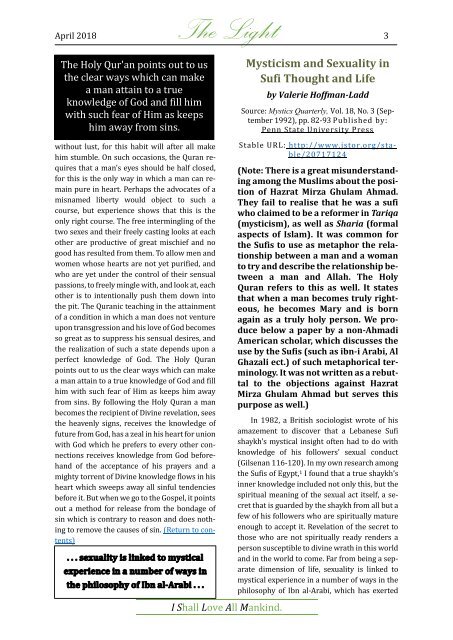The Light April 2018 04
English organ of the Lahore Ahmadiyya Movement. Presenting the Islam taught by the Holy Prophet Muhammad (s) - liberal, inclusive, tolerant, peaceful and rational.
English organ of the Lahore Ahmadiyya Movement. Presenting the Islam taught by the Holy Prophet Muhammad (s) - liberal, inclusive, tolerant, peaceful and rational.
You also want an ePaper? Increase the reach of your titles
YUMPU automatically turns print PDFs into web optimized ePapers that Google loves.
<strong>April</strong> <strong>2018</strong> <strong>The</strong><br />
<strong>Light</strong> 3<br />
<strong>The</strong> Holy Qur'an points out to us<br />
the clear ways which can make<br />
a man attain to a true<br />
knowledge of God and fill him<br />
with such fear of Him as keeps<br />
him away from sins.<br />
Mysticism and Sexuality in<br />
Sufi Thought and Life<br />
by Valerie Hoffman-Ladd<br />
Source: Mystics Quarterly, Vol. 18, No. 3 (September<br />
1992), pp. 82-93 Published by:<br />
Penn State University Press<br />
without lust, for this habit will after all make<br />
him stumble. On such occasions, the Quran requires<br />
that a man's eyes should be half closed,<br />
for this is the only way in which a man can remain<br />
pure in heart. Perhaps the advocates of a<br />
misnamed liberty would object to such a<br />
course, but experience shows that this is the<br />
only right course. <strong>The</strong> free intermingling of the<br />
two sexes and their freely casting looks at each<br />
other are productive of great mischief and no<br />
good has resulted from them. To allow men and<br />
women whose hearts are not yet purified, and<br />
who are yet under the control of their sensual<br />
passions, to freely mingle with, and look at, each<br />
other is to intentionally push them down into<br />
the pit. <strong>The</strong> Quranic teaching in the attainment<br />
of a condition in which a man does not venture<br />
upon transgression and his love of God becomes<br />
so great as to suppress his sensual desires, and<br />
the realization of such a state depends upon a<br />
perfect knowledge of God. <strong>The</strong> Holy Quran<br />
points out to us the clear ways which can make<br />
a man attain to a true knowledge of God and fill<br />
him with such fear of Him as keeps him away<br />
from sins. By following the Holy Quran a man<br />
becomes the recipient of Divine revelation, sees<br />
the heavenly signs, receives the knowledge of<br />
future from God, has a zeal in his heart for union<br />
with God which he prefers to every other connections<br />
receives knowledge from God beforehand<br />
of the acceptance of his prayers and a<br />
mighty torrent of Divine knowledge flows in his<br />
heart which sweeps away all sinful tendencies<br />
before it. But when we go to the Gospel, it points<br />
out a method for release from the bondage of<br />
sin which is contrary to reason and does nothing<br />
to remove the causes of sin. (Return to contents)<br />
I Shall Love All Mankind.<br />
Stable URL: http://www.jstor.org/stable/20717124<br />
(Note: <strong>The</strong>re is a great misunderstanding<br />
among the Muslims about the position<br />
of Hazrat Mirza Ghulam Ahmad.<br />
<strong>The</strong>y fail to realise that he was a sufi<br />
who claimed to be a reformer in Tariqa<br />
(mysticism), as well as Sharia (formal<br />
aspects of Islam). It was common for<br />
the Sufis to use as metaphor the relationship<br />
between a man and a woman<br />
to try and describe the relationship between<br />
a man and Allah. <strong>The</strong> Holy<br />
Quran refers to this as well. It states<br />
that when a man becomes truly righteous,<br />
he becomes Mary and is born<br />
again as a truly holy person. We produce<br />
below a paper by a non-Ahmadi<br />
American scholar, which discusses the<br />
use by the Sufis (such as ibn-i Arabi, Al<br />
Ghazali ect.) of such metaphorical terminology.<br />
It was not written as a rebuttal<br />
to the objections against Hazrat<br />
Mirza Ghulam Ahmad but serves this<br />
purpose as well.)<br />
In 1982, a British sociologist wrote of his<br />
amazement to discover that a Lebanese Sufi<br />
shaykh's mystical insight often had to do with<br />
knowledge of his followers' sexual conduct<br />
(Gilsenan 116-120). In my own research among<br />
the Sufis of Egypt, 1 I found that a true shaykh’s<br />
inner knowledge included not only this, but the<br />
spiritual meaning of the sexual act itself, a secret<br />
that is guarded by the shaykh from all but a<br />
few of his followers who are spiritually mature<br />
enough to accept it. Revelation of the secret to<br />
those who are not spiritually ready renders a<br />
person susceptible to divine wrath in this world<br />
and in the world to come. Far from being a separate<br />
dimension of life, sexuality is linked to<br />
mystical experience in a number of ways in the<br />
philosophy of Ibn al-Arabi, which has exerted














